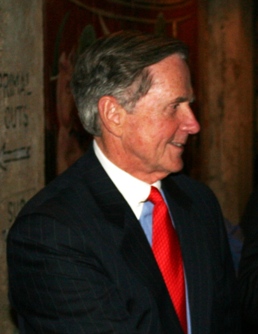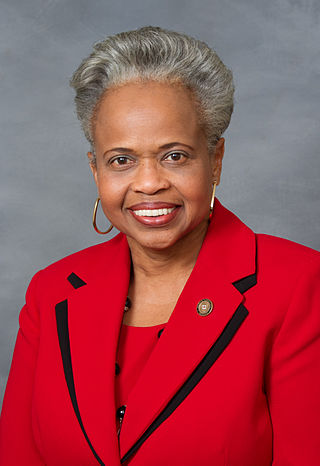
The Democratic Unionist Party (DUP) is a unionist, loyalist, British nationalist and national conservative political party in Northern Ireland. It was founded in 1971 during the Troubles by Ian Paisley, who led the party for the next 37 years. It is currently led by Gavin Robinson, who is stepping in as an interim after the resignation of Jeffrey Donaldson. It is the second largest party in the Northern Ireland Assembly, and is the fifth-largest party in the House of Commons of the United Kingdom. The party has been described as centre-right to right-wing and socially conservative, being anti-abortion and opposing same-sex marriage. The DUP sees itself as defending Britishness and Ulster Protestant culture against Irish nationalism and republicanism. It is also Eurosceptic and supported Brexit.

The Family Compact was a small closed group of men who exercised most of the political, economic and judicial power in Upper Canada from the 1810s to the 1840s. It was the Upper Canadian equivalent of the Château Clique in Lower Canada. It was noted for its conservatism and opposition to democracy.
The Northern Ireland Executive is the devolved government of Northern Ireland, an administrative branch of the legislature – the Northern Ireland Assembly. It is answerable to the assembly and was initially established according to the terms of the Northern Ireland Act 1998, which followed the Good Friday Agreement. The executive is referred to in the legislation as the Executive Committee of the assembly and is an example of consociationalist ("power-sharing") government.

Peter David Robinson is a retired Northern Irish politician who served as First Minister of Northern Ireland from 2008 until 2016 and Leader of the Democratic Unionist Party (DUP) from 2008 until 2015. Until his retirement in 2016, Robinson was involved in Northern Irish politics for over 40 years, being a founding member of the DUP along with Ian Paisley.

Arts Council England is an arm's length non-departmental public body of the Department for Culture, Media and Sport. It is also a registered charity. It was formed in 1994 when the Arts Council of Great Britain was divided into three separate bodies for England, Scotland and Wales. The arts funding system in England underwent considerable reorganisation in 2002 when all of the regional arts boards were subsumed into Arts Council England and became regional offices of the national organisation.

Sir Dove-Myer Robinson was Mayor of Auckland City from 1959 to 1965 and from 1968 to 1980. Holding office for 6,543 days in total, his was the longest tenure of any holder of the office. He was a colourful character and became affectionately known across New Zealand as "Robbie". He was one of several Jewish mayors of Auckland, although he rejected Judaism as a teenager and became a lifelong atheist. He has been described as a "slight, bespectacled man whose tiny stature was offset by a booming voice and massive ego".

James Dixon Robinson III was an American businessman best known for his position as the chief executive officer of American Express Co. from 1977 until his retirement in 1993.

The Legislative Council of Fiji was the colonial precursor to the present-day Parliament, which came into existence when Fiji became independent on 10 October 1970.
Sir Kenneth Robinson was a British Labour politician who served as Minister of Health in Harold Wilson's first government, from 1964 to 1968, when the position was merged into the new title of Secretary of State for Social Services. Robinson died in London on 16 February 1996.
Peter Robinson was a Canadian politician who served as Commissioner of Crown Lands as well as on the Legislative Assembly, Legislative Council, and Executive Council of Upper Canada. He is known for his work in organizing the migration and settlement of what is now Peterborough, Ontario.

The colonial Governors of Fiji relied on the Executive Council for advice on proposals for legislation which, after being discussed in the Executive Council meetings, came before the Legislative Council in the form of bills. In this way, the Executive Council was the chief policy-making body and performed cabinet-like functions, but being advisory, was not yet a cabinet in function. This role changed in 1964 with the introduction of the membership system.

The Academy of the Sacred Heart is a private Catholic high school in New Orleans, Louisiana. It is located within the Archdiocese of New Orleans and was established in 1867 by the Society of the Sacred Heart.

The First Minister and deputy First Minister of Northern Ireland are the joint heads of government of Northern Ireland, leading the Northern Ireland Executive and with overall responsibility for the running of the Executive Office. Despite the titles of the two offices, the two positions have the same governmental power, resulting in a duumvirate; the deputy First Minister, customarily spelled with a lowercase d, is not subordinate to the First Minister. Created under the terms of the 1998 Good Friday Agreement, both were initially nominated and appointed by members of the Northern Ireland Assembly on a joint ticket by a cross-community vote, under consociational principles. That process was changed following the 2006 St Andrews Agreement, such that the First Minister now is nominated by the largest party overall, and the deputy First Minister is nominated by the largest party from the next largest community block.

West Sussex County Council is the upper tier local authority for the non-metropolitan county of West Sussex in England.

The All for Australia League (AFAL) was an Australian political movement during the Great Depression. It was founded in early 1931 and claimed to have amassed 130,000 members by June 1931. Right-wing and anti-establishment in nature, the league had the backing of a number of prominent businessmen and industrialists. It was critical both of the Labor Party and the right-wing Nationalist Party. It primarily operated in Sydney, but also had branches in country New South Wales and absorbed a similar organisation in Victoria. The league eventually chose to co-operate with the existing Nationalist organisation at the 1931 federal election, helping preselect candidates for the new United Australia Party (UAP). After the election victory the league was absorbed by the UAP's state organisation.
A head of college or head of house is the head or senior member of a college within a collegiate university. The title used varies between colleges, including dean, master, president, principal, provost, rector and warden.
The London Transport Executive was the executive agency within the Greater London Council, responsible for public transport in Greater London from 1970 to 1984. In common with all London transport authorities from 1933 to 2000, the public name and operational brand of the organisation was London Transport.

Jaye Robinson is a Canadian politician who has served as a member of the Toronto City Council since 2010. She was the chair of the Toronto Transit Commission (TTC) board from 2018 to 2022. Robinson represents Ward 15 Don Valley West.

A plebiscite on whether the Sanitary Board should have an official or unofficial majority was held in Hong Kong in June 1896. It was the only plebiscite conducted by the Hong Kong Government on record. The other de facto referendum launched by the pro-democracy camp through the by-election in 2010 was not officially recognised.

Gladys Ashe Robinson is a health services executive and serves as a Democratic State Senator for the 28th district in the North Carolina General Assembly. She serves as a Deputy Minority Leader and was first elected in 2010.
















